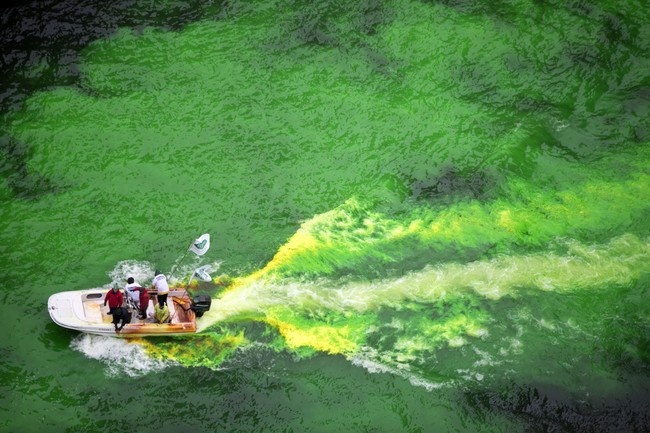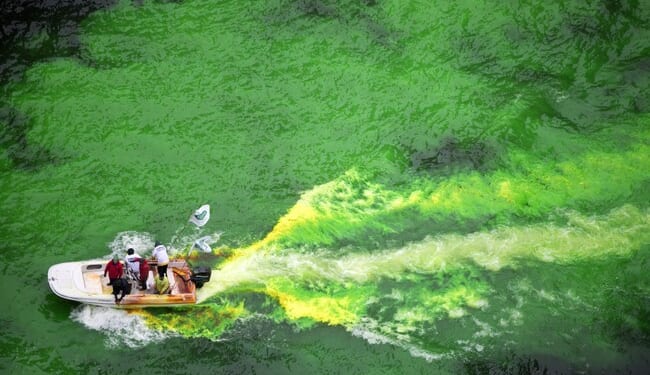
It’s a St. Patrick’s Day tradition in Chicago that dates to 1962. On March 16, the Chicago Journeymen Plumbers Local 130 will dye the Chicago River green. Their website explains how it came about.
The story goes, in 1961, a man by the name of Stephen Bailey — the business manager of the plumbers union — was approached by “one of his plumbers who was wearing some white coveralls,” a post by Local 130 says. It was then the union says, that Bailey noticed the overalls had been stained or dyed with “a perfect shade of green,” or “an Irish green to better describe it.”
When wondering how the coveralls could have turned such a tint, the tale continues, Bailey and his plumbers discovered that it was from to the dye used to detect leaks in the river.
“That’s when Mr. Bailey bellowed,” the Union declares, “Call the mayor … we will dye the Chicago River green!”
That’s one of those stories that if it isn’t true, it should be.
Chicago river dyed green for St Patrick’s Day. pic.twitter.com/iyrDs0XsHa
— Citizen Free Press (@CitizenFreePres) March 16, 2024
For all you greens (left enviro-wackos, not beloved Irish) reading this, have no fear. The green dye is environmentally friendly and won’t harm any of the alligators or sea monsters supposedly lurking in the depths of the polluted river.
Having said that, some greens can’t take “yes” for an answer. Others just want to spoil the fun.
The City of Chicago doesn’t release the ingredients or the type of dye used in its celebration, and there is also no permit for its St. Patrick’s Day event, says Darin. In the past, the Illinois Chapter has recommended to the EPA that the agency require one. In a statement to Sierra, the Illinois EPA stated that while a permit has not been issued for this event, the agency did review the information and safety data for the dye and concluded that there is no toxic effect.
In a 2021 letter to the editor published in the Chicago Sun Times, the Sierra Club Illinois Chapter, Friends of the Chicago River, and Openlands, a conservation nonprofit in the Chicago area, argue that even if the dye isn’t environmentally harmful, the city needs to rethink how it chooses to protect and interact with the river, especially as a signal to residents.
The plumbers refuse to release the formula for the dye. It only lasts about 5 hours and one of the attractions of dying the river green is that, initially, the dye hits the water orange.
“If you were watching this for the first time you would think this is a mistake or a bad joke,” the union said. “You see the dye is orange, and its initial color on the surface of the river is orange, and you would think to yourself ‘what heathen would do something like this.'”
However, once the dye sets in, the color, “in a stroke of luck,” turns, and the “true color magically appears,” reports NBC 5 which streams the event live every year,
“Sure’n if St. Paddy hisself didn’t work some magic to green up the river, now.”












